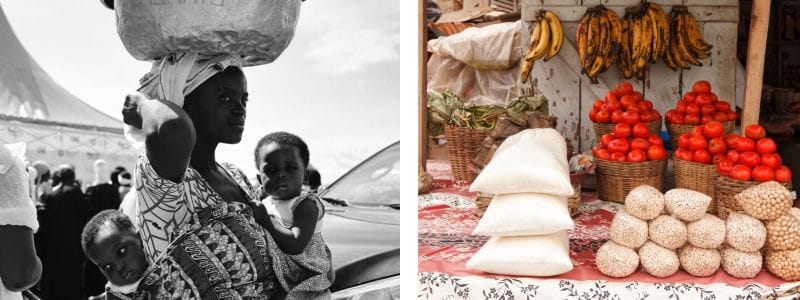Ghana’s rising food prices has been a major issue in recent months. This, along with inflation has flagues the country’s agricultural sector with the threat of food security. Yet, African diasporans can step forward and play their part in addressing this present issue. This intervention will also help other African nations who rely on the country’s agricultural outputs.
How You Can Be Helpful in Reducing Ghana's Rising Food Prices
The real issue at hand is that Ghana’s rising food prices has placed a strain on the country’s economy. This strain has caused higher than expected inflation levels. The way to curb this issue is to produce more food. When more food is produced, the country will rely less on foreign imports which will help the country’s economic well being. As a diasporan, you can join the team of hard working Ghanaian farmers who feed this beautiful African nation.
Recent figures have shown that Ghana’s inflation is on the rise. The most current hike was seen in September 2024 with the rise expected to continue if the problem is not addressed. There have been strategies implemented by the government to help in this regard. It has placed an export ban on Ghana’s grains to maintain enough supply on the local market. There are also initiatives like the Ghana Food Movement that helps to promote Ghana’s food crops as a healthy affordable way to feed the nation.
But this is not enough. With the expertise and resources of the African diaspora, the food situation in the country can be greatly impacted for the better. Diasporans have been exposed to problem solving strategies and technologies that can be assets to the Ghanaian agricultural sector. Moreover, Ghana is in need of more farmers to ensure a sustainable food supply. Better yet, the diaspora can enjoy the many benefits of farming in Ghana by raising their hands and stepping forward.
The Impacts of Ghana's Rising Food Prices

The increase in food prices has placed a heavy burden on households across the country. This is most impactful in urban areas where the cost of basic foodstuffs like rice and maize has soared. These price hikes are primarily the result of a combination of factors, including reduced local agricultural output due to unfavorable weather conditions and global supply chain disruptions.
As food becomes more expensive, the poorest communities are bearing the brunt of the impact. For many Ghanaians, purchasing enough food for their families has become a daily struggle. The rising cost of living is also creating a ripple effect on other sectors of the economy, as the increase in food prices drives up the cost of goods and services across the board.
The Way Forward
Now we must pave a way forward that will ensure a better future for all Ghanaians, and Africans in general. This will not only help mainland Africa, but the economic impacts will stretch beyond our borders into distant foreign lands. Yet, in order for this to happen, there will have to be urgent and drastic change. As a diasporan, you can step forward and move with Ghana towards a brighter future.
The government has pledged to address Ghana’s rising food prices by implementing measures to stabilize prices. Two such measures are providing subsidies to farmers and promoting agricultural production. However, these efforts will take time to yield results, and in the meantime, Ghanaians are left to cope with the economic hardship. The big question is, ‘will the diaspora step forward with a helping hand’?
Final Thoughts
As inflation continues to climb, the urgent need for policy solutions to stabilize Ghana’s rising food prices has elevated. Good policies and proper interventions will reduce the financial burden on citizens and secure a future food supply for Ghana. Diasporans can play their part by helping to grow Ghana’s food crops which will not only help inflation, but also help to feed a nation.











